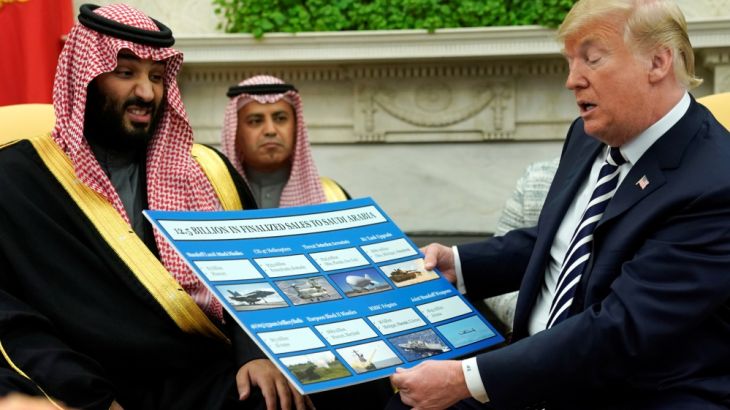Trump: Saudi to pay ‘necessary money’ to help rebuild Syria
Without offering details, US president thanks Riyadh for stepping in to support Syria following US military withdrawal.

US President Donald Trump has said Saudi Arabia will spend the “necessary money” to help reconstruct war-torn Syria, without offering any details.
Trump’s comments on Monday came days after he took to Twitter to announce the withdrawal of all 2,000 US troops from Syria while also abruptly declaring victory over the Islamic State of Iraq and the Levant (ISIL, also known as ISIS) in the country. The surprising decision on Wednesday contradicted his own experts’ assessments and sparked surprise and anger among some of Washington’s allies.
Keep reading
list of 4 itemsDay 1 of Donald Trump’s first criminal trial
What is Donald Trump’s ‘hush money’ trial all about?
In Trump’s New York ‘hush money’ case, prosecutors push election angle
On Monday, in his latest unexpected foreign policy statement made on Twitter, Trump said Riyadh would step in to support Syria following the US military withdrawal.
“Saudi Arabia has now agreed to spend the necessary money needed to help rebuild Syria, instead of the United States. See?” Trump wrote.
“Isn’t it nice when immensely wealthy countries help rebuild their neighbours rather than a Great Country, the US, that is 5,000 miles away. Thanks to Saudi A!”
Saudi Arabia has now agreed to spend the necessary money needed to help rebuild Syria, instead of the United States. See? Isn’t it nice when immensely wealthy countries help rebuild their neighbors rather than a Great Country, the U.S., that is 5000 miles away. Thanks to Saudi A!
— Donald J. Trump (@realDonaldTrump) December 24, 2018
There was no immediate comment from the Saudi government, which in October delivered $100m to the US, two months after pledging the sum to help stabilise parts of Syria and just as the international outcry over the disappearance of Saudi journalist Jamal Khashoggi and Riyadh’s shifting narratives about his fate grew.
‘Who will get the money?’
Al Jazeera’s Rob Reynolds, reporting from Washington, said the initial reaction to Trump’s announcement was “one of bafflement” as no other US officials had commented on his statement which also came on a day that the president was not scheduled to have a telephonic conversation with the Saudi leadership.
“It came out of nowhere and there are more questions than answers, including how much money is he talking about. We know that the Saudis in October delivered $100m intended for Syria reconstruction but the president’s tweet seemed to imply that there was more money that is going to be forthcoming,” said Reynolds.
“Also, how will this money be spent? When will it be disbursed? And most importantly, in a country that is divided into many different spheres of influence, who will get the money?”
The US president has repeatedly expressed his support for Saudi Crown Prince Mohammed bin Salman, also known as MBS, despite CIA assessment that the royal ordered Khashoggi’s killing inside the kingdom’s consulate in the Turkish city of Istanbul in October.
Trump has also defied pressure from US legislators to impose tougher sanctions on Saudi Arabia over the journalist’s murder by indicating that he had no intention of cancelling military contracts with the kingdom.
“The Trump administration sees Saudi Arabia as a strategic partner in the region, and Trump has certainly gone out on the fence to defend that strategic partnership,” Ellen Wald, a senior fellow at the Atlantic Council and the author of Saudi Inc: The Arabian Kingdom’s Pursuit of Profit and Power, told Al Jazeera.
“And now he is saying, ‘look we are still committed to you, now you’ve got to step up and do what needs to be done’ – and it’s definitely been clear from Trump’s policy that they would like Saudi Arabia to really serve as an effective counterpoint in the region to Iran,” she added.
Turkey-US talks
Trump’s decision to pull out of Syria was followed by resignations from Pentagon chief James Mattis and Brett McGurk, special presidential envoy for the global coalition to defeat the ISIL.
The announcement of the withdrawal – which is reportedly going to be completed within 60 to 100 days, comes on the eve of a possible Turkish military operation in northeastern Syria against Kurdish fighters, seen as “terrorists” by Turkey.
A US delegation is expected to head to Turkey this week to discuss cooperation on Syria. US forces have for years backed the Kurdish People’s Protection Forces (YPG)-led Syrian Democratic Forces in the fight against ISIL.
Ankara claims the YPG is an extension of the Kurdistan Workers’ Party, which has waged attacks on Turkish soil since the 1980s as they sought autonomy.